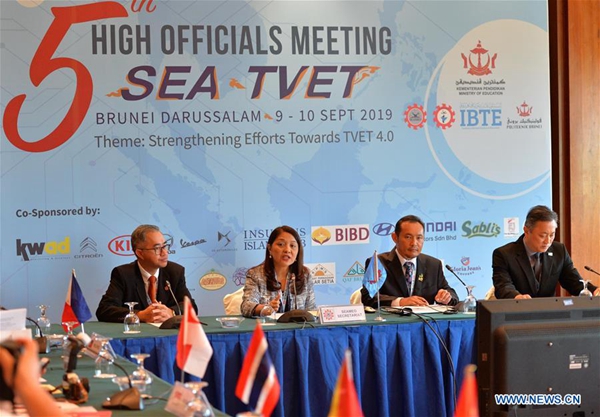ASEAN officials discuss industrial revolution-ready workforce in Brunei
 0 Comment(s)
0 Comment(s) Print
Print E-mail Xinhua, September 10, 2019
E-mail Xinhua, September 10, 2019

Some 150 education officials from the Association of Southeast Asian Nations (ASEAN) met in Brunei on Monday for the 5th High Officials Meeting on Southeast Asian Technical and Vocational Education and Training (SEA-TVET).
The two-day meeting aims to find new strategies for collaboration towards developing human resources that are ready to play in the new era of "Industrial Revolution 4.0".
Besides the member countries, the meeting was also attended by officials from ASEAN partner countries such as China, Japan, South Korea, German, Britain and the United States as well as from international organizations such as United Nations Educational, Scientific and Cultural Organization (UNESCO) and International Labor Organization.
Brunei Education Minister Haji Hamzah said in his opening speech that Technical Vocational Education and Training (TVET) has an important role to play in the 21st century.
"The rapid technological developments and globalization have triggered radical changes in the workplace. ASEAN will have to continuously work together to improve as well as to enhance the effectiveness of TVET for the 21st century," he said, adding that TVET has been identified as one of the seven priority areas of the regional education agenda.
He emphasized that TVET must match the pace of change in the workplace and society as the future will require workers to possess knowledge and skills in cloud computing, big data analysis, robotics, automation and the Internet of Things to perform jobs effectively in an Industry 4.0 Environment.
The minister said this year's theme "Strengthening Efforts towards TVET 4.0" is timely, and efforts such as capacity and matching skills to emerging technologies and modernizing physical facilities, building capacity and matching skills to emerging market demands is important, not only because it culminates towards preparing for the future labor market but also in developing human resources in general.






Go to Forum >>0 Comment(s)